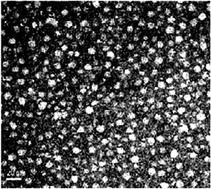Preparation of curcuminoid microemulsions from Curcuma longa L. to enhance inhibition effects on growth of colon cancer cells HT-29
Abstract
The objectives of this study were to extract curcuminoid from Curcuma longa L. (C. longa), a vital medicinal plant demonstrated to possess many biological activities, and prepare the curcuminoid extract and microemulsion for studying the inhibition mechanism of HT-29 colon cancer cells. Results showed that a total of 3 curcuminoids including curcumin, demethoxycurcumin (DMC) and bisdemethoxycurcumin (BDMC), were separated within 10 min by using an Eclipse XDB-18 column and a gradient mobile phase of 0.1% formic acid solution (A) and acetonitrile (B). The curcuminoid microemulsion composed of soybean oil, Tween 80, ethanol and water was prepared with a high stability and mean particle size of 10.9 nm, zeta-potential of −65.2 mV and encapsulation efficiency of 85.7%. Both curcuminoid extract and microemulsion were effective in inhibiting HT-29 cell growth with the IC50 being 3.83 and 2.51 μg mL−1 after 24 h incubation, respectively, but further reduced to 2.23 and 1.94 μg mL−1, after 48 h incubation. Both treatments could decrease the proportion of both viable and necrosis cells and increase the proportion of both early and late apoptosis cells in a dose-dependent manner, with the cell cycle arrested at the S phase. Also, both treatments could up-regulate p53 expression and down-regulate cyclin A and CDK2 expressions through a p21-independent pathway. In addition, the expressions of Bax and cytochrome C as well as the activities of caspase-8, caspase-9 and caspase-3 increased for the curcuminoid extract, while the curcuminoid microemulsion showed the same trend with the exception that an insignificant change (p > 0.05) in Bax expression was observed. Collectively, this study demonstrated that the curcuminoid microemulsion prepared from C. longa may possess great potential for the treatment of colon cancer in the future.



 Please wait while we load your content...
Please wait while we load your content...